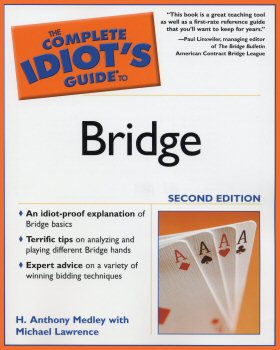| The first edition of Complete Idiot's Guide to Bridge by H. Anthony Medley was the fastest selling beginning bridge book, going through more than 10 printings. This updated Second Edition includes some modern advanced bidding systems and conventions, like Two over One, a system used by many modern tournament players, Roman Key Card Blackwood, New Minor Forcing, Reverse Drury, Forcing No Trump, and others. Also included is a detailed Guide to Bids and Responses, along with the most detailed, 12-page Glossary ever published, as well as examples to make learning the game even easier. Click book to order. | ||
|
|
||
|
Me and Orson Welles (10/10) by Tony Medley Run time 107 minutes. Not for children. Despite what sounds like an ungrammatical title (it
could be the end of the sentence, “This is the story of me and Orson
Welles”), I’ve seen very few movies that I wanted to continue, but I
would have been serenely happy had this kept going for another hour, it
was so entertaining. This is a fictionalized account of the final week
in preparation of Orson Welles’ (Christian McKay) 1937 truncated
production of Shakespeare’s “Julius Caesar” by the fledgling Mercury
Theater. Director Richard Linklater has taken a brilliant screenplay by
Holly Gent Palmo and Vince Palmo (from Robert Kaplo’s novel) and
produced a scintillating recreation of a bygone era and a fascinating
portrait of a man whose reputation as an American genius is more
reputation and style than actual accomplishment. Just about everything about this movie is terrific,
but a big impetus in setting it on a plateau is the music (Marc Marot as
music supervisor with original score by Michael J. McEvoy; I’m not sure
who picked the songs and the way they are played, which include Gershwin
and Richard Rodgers, but I’m assuming it was Marot). The music carries
this film aloft to heights of enjoyment few films achieve. The story of Welles is told through the eyes of an
enthusiastic teen, 17-year-old Richard Samuels (Zac Efron), who luckily
lands a part in Welles’ first production for Mercury. As such he meets
people like producer John Houseman (Eddie Marsan) and young actor Joseph
Cotten (James Tupper), falls in love with Welles’ assistant, Sonja Jones
(Claire Danes), and learns big lessons about life.
But, good
as Efron is, this isn’t a story about Richard, it’s a story about Orson
Welles, at the beginning of his life of fame and controversy. Although
at 35 McKay is far too old to play the 1937 Welles (who was only 22 in
1937), he gives a bravura performance as a young man who seems in total
control of everything. Unlike some other actors playing real people he
doesn’t try to sound exactly like Orson, although there is a similarity.
Instead, he recreates the man’s pompous personality, charm, and
self-confidence.
The
film’s presentation of that week of rehearsals, actors preparing for
what became a memorable event, the way that Welles cajoled them into
giving the performance he wanted, and the interplay among them all, is
captivating. Because the film ignores his age, and because McKay looks
like the 35-year-old man he is, it makes the viewing so much more
enjoyable if one keeps in mind the tenderness of Welles’ actual years.
Who he was, how he dominated, and what he accomplished at such a young
age are truly extraordinary. Welles used to eat lunch every day at Ma Maison
restaurant on I had a friend who appeared as a guest with Welles
on a Merv Griffin show. Despite his confident appearance, she told me
that when she looked at him at one of the breaks his eyes were filled
with fear. Maybe his ability to hide and channel fear validates his
reputation as an exceptional actor. The weakest part of the film is Danes, an actress
I’ve admired for her performances in films like “Stage Beauty” (2004),
“Evening” (2007) and “Stardust” (2007). In this, unlike the others, she
misses the mark. She is far too effervescent and scintillating for the
part she plays, an ambitious woman who eagerly succumbs to Welles’
exercising his droit du seigneur
to get ahead. Most of the time when she was onscreen I found her
unpersuasive. But that is far outweighed by the ambience
Linklater creates, and the performances of McKay and Efron.
I could have watched another
hour. In fact, the only reason I looked at my watch was to hope that the
end wasn’t approaching. This is a film that will delight those who, like
me, exult in the hesternal excitements of yesteryear.
|
||
